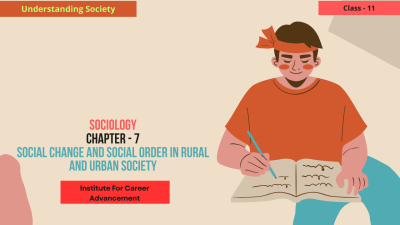Courses


 Compare
Compare
"Indian Sociologists" is a pivotal chapter in Class 11 Sociology, exploring the rich intellectual tradition of sociological thought in India. It delves into the contributions of eminent Indian sociologists who have significantly shaped the understanding of Indian society and its social processes. Key Themes and Concepts: Emergence of Indian Sociology: This section examines the historical context in which Indian sociology emerged as a distinct field of study, influenced by both Western sociological traditions and unique Indian cultural and social realities. Pioneering Indian Sociologists: It focuses on the contributions of early Indian sociologists like G.S. Ghurye, M.N. Srinivas, and A.R. Desai, who laid the foundation for Indian sociological research. Diverse Perspectives: The chapter explores the diverse theoretical and methodological approaches adopted by Indian sociologists, including structural-functionalism, Marxism, feminism, and postcolonialism. Major Themes and Issues: It highlights the key themes and issues that have been central to Indian sociological research, such as caste, religion, social change, gender, and rural development. Contemporary Indian Sociology: The chapter also examines the contributions of contemporary Indian sociologists, who are actively engaged in research on diverse social issues and challenges facing India today. Learning Outcomes: Understanding the historical development of Indian sociology. Acquiring knowledge about the key ideas and contributions of major Indian sociologists. Developing an appreciation for the diverse theoretical and methodological perspectives in Indian sociology. Analyzing contemporary social issues and problems through a sociological lens. By studying this chapter, students gain a comprehensive understanding of the rich intellectual tradition of Indian sociology and its relevance in understanding contemporary Indian society. This knowledge is essential for further exploration of sociological concepts and their application in Indian context. "ভারতীয় সমাজবিজ্ঞানীরা" হল একাদশ শ্রেণীর সমাজবিজ্ঞানের একটি গুরুত্বপূর্ণ অধ্যায়, যা ভারতে সমাজতাত্ত্বিক চিন্তার সমৃদ্ধ বুদ্ধিবৃত্তিক ঐতিহ্যকে অন্বেষণ করে। এটি বিশিষ্ট ভারতীয় সমাজবিজ্ঞানীদের অবদানের উপর আলোকপাত করে, যাঁরা ভারতীয় সমাজ এবং এর সামাজিক প্রক্রিয়াগুলির বোধগম্যতাকে উল্লেখযোগ্যভাবে রূপ দিয়েছেন। মূল বিষয় ও ধারণাঃ ভারতীয় সমাজবিজ্ঞানের উত্থানঃ এই বিভাগটি সেই ঐতিহাসিক প্রেক্ষাপটটি পরীক্ষা করে যেখানে ভারতীয় সমাজবিজ্ঞান পাশ্চাত্য সমাজতাত্ত্বিক ঐতিহ্য এবং অনন্য ভারতীয় সাংস্কৃতিক ও সামাজিক বাস্তবতা উভয়ের দ্বারা প্রভাবিত হয়ে অধ্যয়নের একটি স্বতন্ত্র ক্ষেত্র হিসাবে আবির্ভূত হয়েছিল। অগ্রগামী ভারতীয় সমাজবিজ্ঞানীঃ এটি G.S. এর মতো প্রাথমিক ভারতীয় সমাজবিজ্ঞানীদের অবদানের উপর দৃষ্টি নিবদ্ধ করে। ঘুরিয়ে, M.N. শ্রীনিবাস, এবং A.R. দেশাই, যিনি ভারতীয় সমাজতাত্ত্বিক গবেষণার ভিত্তি স্থাপন করেছিলেন। বৈচিত্র্যময় দৃষ্টিভঙ্গিঃ এই অধ্যায়টি ভারতীয় সমাজবিজ্ঞানীদের দ্বারা গৃহীত বিভিন্ন তাত্ত্বিক এবং পদ্ধতিগত পদ্ধতির অন্বেষণ করে, যার মধ্যে রয়েছে কাঠামোগত-কার্যকারিতা, মার্কসবাদ, নারীবাদ এবং উত্তর-উপনিবেশবাদ। প্রধান বিষয় এবং বিষয়গুলিঃ এটি ভারতীয় সমাজতাত্ত্বিক গবেষণার কেন্দ্রবিন্দুতে থাকা মূল বিষয় এবং বিষয়গুলি যেমন বর্ণ, ধর্ম, সামাজিক পরিবর্তন, লিঙ্গ এবং গ্রামীণ উন্নয়নের উপর আলোকপাত করে। সমসাময়িক ভারতীয় সমাজবিজ্ঞানঃ এই অধ্যায়ে সমসাময়িক ভারতীয় সমাজবিজ্ঞানীদের অবদানও পরীক্ষা করা হয়েছে, যারা আজ ভারতের সামনে বিভিন্ন সামাজিক সমস্যা এবং চ্যালেঞ্জ নিয়ে গবেষণায় সক্রিয়ভাবে জড়িত। শেখার ফলাফলঃ ভারতীয় সমাজবিজ্ঞানের ঐতিহাসিক বিকাশকে বোঝা। প্রধান ভারতীয় সমাজবিজ্ঞানীদের মূল ধারণা এবং অবদান সম্পর্কে জ্ঞান অর্জন করা। ভারতীয় সমাজবিজ্ঞানের বৈচিত্র্যময় তাত্ত্বিক ও পদ্ধতিগত দৃষ্টিভঙ্গির প্রতি উপলব্ধি গড়ে তোলা। সমাজতাত্ত্বিক লেন্সের মাধ্যমে সমসাময়িক সামাজিক সমস্যা এবং সমস্যাগুলি বিশ্লেষণ করা। এই অধ্যায়টি অধ্যয়নের মাধ্যমে শিক্ষার্থীরা ভারতীয় সমাজবিজ্ঞানের সমৃদ্ধ বুদ্ধিবৃত্তিক ঐতিহ্য এবং সমসাময়িক ভারতীয় সমাজকে বোঝার ক্ষেত্রে এর প্রাসঙ্গিকতা সম্পর্কে ব্যাপক ধারণা অর্জন করে। এই জ্ঞান সমাজতাত্ত্বিক ধারণাগুলির আরও অন্বেষণ এবং ভারতীয় প্রেক্ষাপটে তাদের প্রয়োগের জন্য অপরিহার্য।
₹599
0 Lessons
Hours

 Compare
Compare
"Introducing Western Sociologists" is a pivotal chapter in Class 11 Sociology, delving into the foundational contributions of key thinkers who shaped the discipline. It explores the intellectual landscape of the 19th and early 20th centuries, where sociology emerged as a distinct field of study in response to the rapid social and economic changes occurring in Western Europe. Key Themes and Concepts: The Emergence of Sociology: This section examines the historical context that gave rise to sociology, including the Enlightenment, the French Revolution, and the Industrial Revolution. It highlights the need to understand society beyond religious and metaphysical explanations. Karl Marx (1818-1883): Marx is considered one of the founding fathers of sociology. His analysis of society focused on the conflict between the bourgeoisie (the owners of the means of production) and the proletariat (the working class). He emphasized the importance of economic factors in shaping social structures and institutions. Emile Durkheim (1858-1917): Durkheim was a French sociologist who emphasized the importance of social solidarity and collective consciousness. He studied the role of social institutions in maintaining social order and cohesion. His work on suicide highlighted the impact of social integration and regulation on individual behavior. Max Weber (1864-1920): Weber was a German sociologist who focused on the role of individual action and interpretation in shaping social behavior. He developed the concept of verstehen (understanding), which emphasized the importance of empathetic understanding of social phenomena. Weber also studied the relationship between religion and economic development, particularly in the context of Western capitalism. Learning Outcomes: Understanding the historical context in which sociology emerged. Acquiring knowledge about the key ideas and contributions of major Western sociologists, such as Marx, Durkheim, and Weber. Developing an appreciation for the diverse theoretical perspectives in sociology. Applying sociological concepts to analyze contemporary social issues and problems. By studying this chapter, students gain a comprehensive understanding of the foundational ideas of sociology and the contributions of its key thinkers. This knowledge is essential for further exploration of sociological concepts and their application in understanding the social world. "পাশ্চাত্য সমাজবিজ্ঞানীদের পরিচয়" হল একাদশ শ্রেণীর সমাজবিজ্ঞানের একটি গুরুত্বপূর্ণ অধ্যায়, যা মূল চিন্তাবিদদের মৌলিক অবদানের উপর আলোকপাত করে যারা এই শাখাকে রূপ দিয়েছেন। এটি ঊনবিংশ এবং বিংশ শতাব্দীর গোড়ার দিকের বুদ্ধিবৃত্তিক ভূদৃশ্য অন্বেষণ করে, যেখানে পশ্চিম ইউরোপে ঘটে যাওয়া দ্রুত সামাজিক ও অর্থনৈতিক পরিবর্তনের প্রতিক্রিয়ায় সমাজবিজ্ঞান অধ্যয়নের একটি স্বতন্ত্র ক্ষেত্র হিসাবে আবির্ভূত হয়েছিল। মূল বিষয় ও ধারণাঃ সমাজবিজ্ঞানের উত্থানঃ এই বিভাগটি আলোকিতকরণ, ফরাসি বিপ্লব এবং শিল্প বিপ্লব সহ সমাজবিজ্ঞানের জন্মদানকারী ঐতিহাসিক প্রেক্ষাপট পরীক্ষা করে। এটি ধর্মীয় এবং অধিবিদ্যামূলক ব্যাখ্যার বাইরে সমাজকে বোঝার প্রয়োজনীয়তার উপর আলোকপাত করে। কার্ল মার্কস (1818-1883) মার্কসকে সমাজবিজ্ঞানের জনক হিসেবে বিবেচনা করা হয়। সমাজ সম্পর্কে তাঁর বিশ্লেষণ বুর্জোয়া (উৎপাদনের মাধ্যমের মালিক) এবং প্রলেতারিয়েতের মধ্যে দ্বন্দ্বের উপর দৃষ্টি নিবদ্ধ করে। (the working class). তিনি সামাজিক কাঠামো ও প্রতিষ্ঠান গঠনে অর্থনৈতিক বিষয়গুলির গুরুত্বের ওপর জোর দেন। এমিল ডুরখেইম (1858-1917) একজন ফরাসি সমাজবিজ্ঞানী যিনি সামাজিক সংহতি এবং সম্মিলিত চেতনার গুরুত্বের উপর জোর দিয়েছিলেন। তিনি সামাজিক শৃঙ্খলা ও সংহতি বজায় রাখতে সামাজিক প্রতিষ্ঠানগুলির ভূমিকা অধ্যয়ন করেন। আত্মহত্যার উপর তাঁর কাজ ব্যক্তিগত আচরণের উপর সামাজিক সংহতকরণ এবং নিয়ন্ত্রণের প্রভাবকে তুলে ধরেছিল। ম্যাক্স ওয়েবার (1864-1920) একজন জার্মান সমাজবিজ্ঞানী যিনি সামাজিক আচরণ গঠনে ব্যক্তিগত কর্ম এবং ব্যাখ্যার ভূমিকার উপর দৃষ্টি নিবদ্ধ করেছিলেন। তিনি ভার্স্তেহেনের (বোঝাপড়া) ধারণাটি তৈরি করেছিলেন যা সামাজিক ঘটনাগুলির সহানুভূতিশীল বোঝার গুরুত্বের উপর জোর দিয়েছিল। ওয়েবার ধর্ম এবং অর্থনৈতিক উন্নয়নের মধ্যে সম্পর্কও অধ্যয়ন করেন, বিশেষ করে পশ্চিমা পুঁজিবাদের প্রেক্ষাপটে। শেখার ফলাফলঃ ঐতিহাসিক প্রেক্ষাপটে সমাজবিজ্ঞানের উদ্ভব বুঝতে পারা। মার্কস, ডুরখেইম এবং ওয়েবারের মতো প্রধান পশ্চিমা সমাজবিজ্ঞানীদের মূল ধারণা এবং অবদান সম্পর্কে জ্ঞান অর্জন করা। সমাজবিজ্ঞানের বিভিন্ন তাত্ত্বিক দৃষ্টিভঙ্গির প্রতি উপলব্ধি গড়ে তোলা। সমসাময়িক সামাজিক সমস্যা ও সমস্যা বিশ্লেষণের জন্য সমাজতাত্ত্বিক ধারণাগুলি প্রয়োগ করা। এই অধ্যায়টি অধ্যয়নের মাধ্যমে শিক্ষার্থীরা সমাজবিজ্ঞানের মৌলিক ধারণাগুলি এবং এর মূল চিন্তাবিদদের অবদান সম্পর্কে ব্যাপক ধারণা অর্জন করে। এই জ্ঞান সমাজতাত্ত্বিক ধারণাগুলির আরও অন্বেষণ এবং সামাজিক বিশ্বকে বোঝার ক্ষেত্রে তাদের প্রয়োগের জন্য অপরিহার্য।
₹599
0 Lessons
Hours

 Compare
Compare
Social Change and Social Order in Rural and Urban Society is a crucial chapter in Class 11 Sociology, exploring the dynamics of social change and the maintenance of social order in both rural and urban settings. Key themes and concepts include: Social Change: The process of transformation in social structures, relationships, and institutions over time. Factors of Social Change: The various factors that can influence social change, including technological advancements, economic development, social movements, and cultural shifts. Social Order: The mechanisms through which societies maintain stability and cohesion, including social norms, values, and institutions. Rural-Urban Differences: The distinct characteristics and challenges of social change and social order in rural and urban areas. Rural-Urban Migration: The movement of people from rural to urban areas and its impact on both rural and urban societies. Social Stratification: The unequal distribution of resources and opportunities within societies, including the role of social institutions in perpetuating or challenging inequality. Case Studies: Examples of social change and social order in specific rural and urban contexts, such as the impact of industrialization on rural communities and the challenges of urban development in developing countries. By studying this chapter, students gain a deeper understanding of the complex interplay between social change and social order, as well as the unique challenges and opportunities faced by rural and urban societies. গ্রামীণ ও শহুরে সমাজে সামাজিক পরিবর্তন ও সামাজিক শৃঙ্খলা একাদশ শ্রেণীর সমাজবিজ্ঞানের একটি গুরুত্বপূর্ণ অধ্যায়, যা গ্রামীণ ও শহুরে উভয় ক্ষেত্রেই সামাজিক পরিবর্তনের গতিশীলতা এবং সামাজিক শৃঙ্খলা বজায় রাখার অন্বেষণ করে। মূল বিষয় এবং ধারণাগুলির মধ্যে রয়েছেঃ সামাজিক পরিবর্তনঃ সময়ের সাথে সাথে সামাজিক কাঠামো, সম্পর্ক এবং প্রতিষ্ঠানের রূপান্তর প্রক্রিয়া। সামাজিক পরিবর্তনের কারণঃ প্রযুক্তিগত অগ্রগতি, অর্থনৈতিক উন্নয়ন, সামাজিক আন্দোলন এবং সাংস্কৃতিক পরিবর্তন সহ বিভিন্ন কারণ যা সামাজিক পরিবর্তনকে প্রভাবিত করতে পারে। সামাজিক শৃঙ্খলাঃ যে প্রক্রিয়াগুলির মাধ্যমে সমাজ সামাজিক নিয়ম, মূল্যবোধ এবং প্রতিষ্ঠানগুলি সহ স্থিতিশীলতা এবং সংহতি বজায় রাখে। গ্রামীণ-শহুরে পার্থক্যঃ গ্রামীণ ও শহুরে অঞ্চলে সামাজিক পরিবর্তন এবং সামাজিক শৃঙ্খলার স্বতন্ত্র বৈশিষ্ট্য ও চ্যালেঞ্জ। গ্রামীণ-শহুরে অভিবাসনঃ গ্রামীণ থেকে শহুরে অঞ্চলে মানুষের চলাচল এবং গ্রামীণ ও শহুরে উভয় সমাজের উপর এর প্রভাব। সামাজিক স্তরবিন্যাসঃ সমাজের মধ্যে সম্পদ ও সুযোগ-সুবিধার অসম বন্টন, যার মধ্যে রয়েছে অসমতা বজায় রাখা বা চ্যালেঞ্জ করার ক্ষেত্রে সামাজিক প্রতিষ্ঠানের ভূমিকা। কেস স্টাডিঃ নির্দিষ্ট গ্রামীণ ও শহুরে প্রেক্ষাপটে সামাজিক পরিবর্তন এবং সামাজিক শৃঙ্খলার উদাহরণ, যেমন গ্রামীণ সম্প্রদায়ের উপর শিল্পায়নের প্রভাব এবং উন্নয়নশীল দেশগুলিতে নগর উন্নয়নের চ্যালেঞ্জ। এই অধ্যায়টি অধ্যয়নের মাধ্যমে, শিক্ষার্থীরা সামাজিক পরিবর্তন এবং সামাজিক শৃঙ্খলার মধ্যে জটিল পারস্পরিক ক্রিয়ার পাশাপাশি গ্রামীণ ও শহুরে সমাজের অনন্য চ্যালেঞ্জ এবং সুযোগগুলি সম্পর্কে গভীর ধারণা অর্জন করে।
₹599
0 Lessons
Hours

 Compare
Compare
Culture and Socialization is a crucial chapter in Class 11 Sociology, exploring the fundamental concepts of culture and the process of socialization. Key themes and concepts include: Culture: The shared beliefs, values, norms, and behaviors that characterize a particular group or society. Elements of Culture: The different components of culture, including material culture, nonmaterial culture, symbols, language, and beliefs. Cultural Diversity: The existence of multiple cultures within a society and the challenges and opportunities associated with cultural diversity. Socialization: The process through which individuals learn the norms, values, and behaviors of their culture. Agents of Socialization: The various agents that influence the socialization process, such as family, schools, peers, and the media. Socialization and Identity Formation: The role of socialization in shaping individuals' identities and sense of self. Culture and Social Change: The relationship between culture and social change, including the ways in which culture can both resist and promote change. By studying this chapter, students gain a deeper understanding of the role of culture in shaping societies and individuals, as well as the process of socialization and its impact on identity formation. সংস্কৃতি ও সামাজিকীকরণ একাদশ শ্রেণীর সমাজবিজ্ঞানের একটি গুরুত্বপূর্ণ অধ্যায়, যা সংস্কৃতির মৌলিক ধারণাগুলি এবং সামাজিকীকরণের প্রক্রিয়াটি অন্বেষণ করে। মূল বিষয় এবং ধারণাগুলির মধ্যে রয়েছেঃ সংস্কৃতিঃ একটি নির্দিষ্ট গোষ্ঠী বা সমাজকে চিহ্নিত করে এমন ভাগ করা বিশ্বাস, মূল্যবোধ, নিয়ম এবং আচরণ। সংস্কৃতির উপাদানঃ বস্তুগত সংস্কৃতি, অ-বস্তুগত সংস্কৃতি, প্রতীক, ভাষা এবং বিশ্বাস সহ সংস্কৃতির বিভিন্ন উপাদান। সাংস্কৃতিক বৈচিত্র্যঃ একটি সমাজের মধ্যে একাধিক সংস্কৃতির অস্তিত্ব এবং সাংস্কৃতিক বৈচিত্র্যের সাথে সম্পর্কিত চ্যালেঞ্জ ও সুযোগ। সামাজিকীকরণঃ সেই প্রক্রিয়া যার মাধ্যমে ব্যক্তিরা তাদের সংস্কৃতির নিয়ম, মূল্যবোধ এবং আচরণগুলি শিখতে পারে। সামাজিকীকরণের এজেন্টঃ বিভিন্ন এজেন্ট যা সামাজিকীকরণ প্রক্রিয়াকে প্রভাবিত করে, যেমন পরিবার, স্কুল, সমবয়সী এবং মিডিয়া। সামাজিকীকরণ এবং পরিচয় গঠনঃ ব্যক্তির পরিচয় এবং নিজের অনুভূতি গঠনে সামাজিকীকরণের ভূমিকা। সংস্কৃতি ও সামাজিক পরিবর্তনঃ সংস্কৃতি ও সামাজিক পরিবর্তনের মধ্যে সম্পর্ক, যার মধ্যে সংস্কৃতি পরিবর্তনকে প্রতিরোধ ও প্রচার করতে পারে। এই অধ্যায়টি অধ্যয়নের মাধ্যমে শিক্ষার্থীরা সমাজ ও ব্যক্তি গঠনে সংস্কৃতির ভূমিকা, পাশাপাশি সামাজিকীকরণের প্রক্রিয়া এবং পরিচয় গঠনে এর প্রভাব সম্পর্কে গভীর ধারণা অর্জন করে।
₹599
0 Lessons
Hours

 Compare
Compare
Understanding Social Institutions is a crucial chapter in Class 11 Sociology, exploring the fundamental structures and systems that shape societies. Key themes and concepts include: Definition and Types: Various types of social institutions, such as family, education, religion, economy, and politics, and their roles in society. Functions of Social Institutions: The ways in which social institutions contribute to the maintenance of social order, the transmission of culture, and the socialization of individuals. Social Institutions and Social Change: The role of social institutions in both preserving and transforming societies, including the impact of social movements and technological advancements. Social Institutions and Social Inequality: The ways in which social institutions can perpetuate or challenge social inequalities, such as class, gender, and race. Case Studies: Examples of specific social institutions and their functions in different societies, including the family in traditional and modern contexts, the role of education in social mobility, and the impact of religion on social values. By studying this chapter, students gain a deeper understanding of the fundamental structures that shape societies, their functions, and their impact on individuals and social relationships. সামাজিক প্রতিষ্ঠানগুলি বোঝা একাদশ শ্রেণীর সমাজবিজ্ঞানের একটি গুরুত্বপূর্ণ অধ্যায়, যা সমাজকে রূপদানকারী মৌলিক কাঠামো এবং ব্যবস্থাগুলি অন্বেষণ করে। মূল বিষয় এবং ধারণাগুলির মধ্যে রয়েছেঃ সংজ্ঞা এবং প্রকারঃ বিভিন্ন ধরনের সামাজিক প্রতিষ্ঠান, যেমন পরিবার, শিক্ষা, ধর্ম, অর্থনীতি এবং রাজনীতি এবং সমাজে তাদের ভূমিকা। সামাজিক প্রতিষ্ঠানের কার্যাবলীঃ সামাজিক প্রতিষ্ঠানগুলি যেভাবে সামাজিক শৃঙ্খলা বজায় রাখতে, সংস্কৃতির সম্প্রসারণে এবং ব্যক্তিদের সামাজিকীকরণের ক্ষেত্রে অবদান রাখে। সামাজিক প্রতিষ্ঠান ও সামাজিক পরিবর্তনঃ সামাজিক আন্দোলন ও প্রযুক্তিগত অগ্রগতির প্রভাব সহ সমাজ সংরক্ষণ ও রূপান্তর উভয় ক্ষেত্রেই সামাজিক প্রতিষ্ঠানের ভূমিকা। সামাজিক প্রতিষ্ঠান এবং সামাজিক বৈষম্যঃ সামাজিক প্রতিষ্ঠানগুলি শ্রেণী, লিঙ্গ এবং বর্ণের মতো সামাজিক বৈষম্যকে স্থায়ী বা চ্যালেঞ্জ করতে পারে। কেস স্টাডিঃ ঐতিহ্যগত ও আধুনিক প্রেক্ষাপটে পরিবার সহ বিভিন্ন সমাজে নির্দিষ্ট সামাজিক প্রতিষ্ঠান এবং তাদের কার্যাবলীর উদাহরণ, সামাজিক চলাচলে শিক্ষার ভূমিকা এবং সামাজিক মূল্যবোধের উপর ধর্মের প্রভাব। এই অধ্যায়টি অধ্যয়নের মাধ্যমে শিক্ষার্থীরা সমাজকে রূপদানকারী মৌলিক কাঠামো, তাদের কার্যকারিতা এবং ব্যক্তি ও সামাজিক সম্পর্কের উপর তাদের প্রভাব সম্পর্কে গভীর ধারণা অর্জন করে।
₹599
0 Lessons
Hours

 Compare
Compare
Terms, Concepts and their Use in Sociology is a fundamental chapter in Class 11 Sociology, introducing students to the key vocabulary and ideas central to the discipline. Key themes and concepts include: Sociological Terms: Definitions and explanations of core sociological terms, such as society, culture, socialization, social institutions, social stratification, and social change. Theoretical Perspectives: An overview of major sociological theories, including functionalism, conflict theory, and symbolic interactionism, and their applications in understanding social phenomena. Methods of Sociological Inquiry: The different methods used by sociologists to study society, such as surveys, interviews, observation, and experiments. Importance of Sociological Concepts: The significance of understanding sociological terms and concepts in analyzing social issues, understanding human behavior, and making informed decisions. By studying this chapter, students develop a strong foundation in sociological terminology and gain a basic understanding of the theoretical and methodological approaches used in the discipline. সমাজবিজ্ঞানে শর্তাবলী, ধারণা এবং তাদের ব্যবহার একাদশ শ্রেণির সমাজবিজ্ঞানের একটি মৌলিক অধ্যায়, যা শিক্ষার্থীদের মূল শব্দভান্ডার এবং ধারণার সাথে পরিচয় করিয়ে দেয়। মূল বিষয় এবং ধারণাগুলির মধ্যে রয়েছেঃ সমাজতাত্ত্বিক পদঃ সমাজ, সংস্কৃতি, সামাজিকীকরণ, সামাজিক প্রতিষ্ঠান, সামাজিক স্তরবিন্যাস এবং সামাজিক পরিবর্তনের মতো মূল সমাজতাত্ত্বিক পদগুলির সংজ্ঞা এবং ব্যাখ্যা। তাত্ত্বিক দৃষ্টিভঙ্গিঃ কার্যকারিতা, দ্বন্দ্ব তত্ত্ব এবং প্রতীকী মিথস্ক্রিয়াবাদ সহ প্রধান সমাজতাত্ত্বিক তত্ত্বগুলির একটি সংক্ষিপ্ত বিবরণ এবং সামাজিক ঘটনা বোঝার ক্ষেত্রে তাদের প্রয়োগ। সমাজতাত্ত্বিক তদন্তের পদ্ধতিঃ সমাজবিজ্ঞানীরা সমাজ অধ্যয়নের জন্য বিভিন্ন পদ্ধতি ব্যবহার করেন, যেমন সমীক্ষা, সাক্ষাৎকার, পর্যবেক্ষণ এবং পরীক্ষা-নিরীক্ষা। সমাজতাত্ত্বিক ধারণার গুরুত্বঃ সামাজিক সমস্যাগুলি বিশ্লেষণ, মানুষের আচরণ বোঝার এবং অবহিত সিদ্ধান্ত গ্রহণের ক্ষেত্রে সমাজতাত্ত্বিক শর্তাবলী এবং ধারণাগুলি বোঝার তাৎপর্য। এই অধ্যায়টি অধ্যয়নের মাধ্যমে শিক্ষার্থীরা সমাজতাত্ত্বিক পরিভাষায় একটি শক্তিশালী ভিত্তি গড়ে তোলে এবং শাখায় ব্যবহৃত তাত্ত্বিক ও পদ্ধতিগত পদ্ধতির মৌলিক ধারণা অর্জন করে।
₹599
0 Lessons
Hours

 Compare
Compare
Sociology, Society and its relationship with other Social Science disciplines is a crucial chapter in Class 11 Sociology, exploring the nature of sociology as a social science and its connections with other related disciplines. Key themes and concepts include: Sociology as a Social Science: The definition, scope, and methods of sociology, distinguishing it from other social sciences. Society and its Characteristics: The concept of society, its essential characteristics, and the different perspectives on its nature and origins. Relationship with Other Social Sciences: The interconnections and overlaps between sociology and other disciplines like anthropology, economics, political science, psychology, and history. Sociological Methods: The various methods used by sociologists to study society, including surveys, interviews, observation, and experiments. Importance of Sociology: The significance of sociology in understanding social phenomena, addressing social problems, and promoting social change. By studying this chapter, students gain a foundational understanding of sociology as a discipline, its relationship with other social sciences, and its relevance in contemporary society. সমাজবিজ্ঞান, সমাজবিজ্ঞান এবং অন্যান্য সামাজিক বিজ্ঞান শাখার সাথে এর সম্পর্ক একাদশ শ্রেণীর সমাজবিজ্ঞানের একটি গুরুত্বপূর্ণ অধ্যায়, যা সমাজবিজ্ঞানের প্রকৃতি এবং অন্যান্য সম্পর্কিত শাখার সাথে এর সংযোগগুলি অন্বেষণ করে। মূল বিষয় এবং ধারণাগুলির মধ্যে রয়েছেঃ একটি সামাজিক বিজ্ঞান হিসাবে সমাজবিজ্ঞানঃ সমাজবিজ্ঞানের সংজ্ঞা, সুযোগ এবং পদ্ধতি, এটি অন্যান্য সামাজিক বিজ্ঞান থেকে আলাদা করে। সমাজ ও তার বৈশিষ্ট্যসমূহঃ সমাজের ধারণা, এর অপরিহার্য বৈশিষ্ট্য এবং এর প্রকৃতি ও উৎস সম্পর্কে বিভিন্ন দৃষ্টিভঙ্গি। অন্যান্য সমাজবিজ্ঞানের সঙ্গে সম্পর্কঃ সমাজবিজ্ঞান এবং নৃতত্ত্ব, অর্থনীতি, রাষ্ট্রবিজ্ঞান, মনোবিজ্ঞান এবং ইতিহাসের মতো অন্যান্য শাখার মধ্যে আন্তঃসংযোগ এবং ওভারল্যাপ। সমাজতাত্ত্বিক পদ্ধতিঃ সমাজবিজ্ঞানীরা সমাজ অধ্যয়নের জন্য বিভিন্ন পদ্ধতি ব্যবহার করেন, যার মধ্যে রয়েছে সমীক্ষা, সাক্ষাৎকার, পর্যবেক্ষণ এবং পরীক্ষা-নিরীক্ষা। সমাজবিজ্ঞানের গুরুত্বঃ সামাজিক ঘটনাগুলি বোঝার, সামাজিক সমস্যাগুলির সমাধান এবং সামাজিক পরিবর্তনের প্রচারে সমাজবিজ্ঞানের গুরুত্ব। এই অধ্যায়টি অধ্যয়নের মাধ্যমে শিক্ষার্থীরা সমাজবিজ্ঞানকে একটি শাখা হিসাবে, অন্যান্য সামাজিক বিজ্ঞানের সাথে এর সম্পর্ক এবং সমসাময়িক সমাজে এর প্রাসঙ্গিকতা সম্পর্কে একটি মৌলিক ধারণা অর্জন করে।
₹599
0 Lessons
Hours